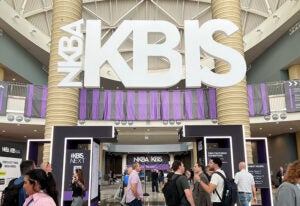


“The collective effervescence of being in a room with other people and having a shared experience is something that cannot be underestimated and cannot be replicated virtually.”
As a frequent speaker at meetings and events around the world, Noreena Hertz has a good sense of the unique challenges event strategists are facing in the current moment. One indication: The booking window for her speaking engagements has shrunk significantly, reflecting the uncertainty surrounding business events and the growing need for more nimble planning. Hertz aims to equip Convening EMEA 2025 participants with insights to help them not only navigate present-day conditions but help them plan for what’s around the corner during her opening keynote in Rotterdam, Netherlands, on Oct. 14, drawing on her wealth of expertise spanning economics, technology, politics, and society.
Hertz earned a Ph.D. in economics from Cambridge University in the U.K. as well as an MBA at the University of Pennsylvania’s Wharton School of Economics. Her best-selling books include Eyes Wide Open, a practical guide to navigating a world overloaded with data, and The Lonely Century, exploring how loneliness has contributed to the rise of political populism. She has advised global leaders and major corporations. And serves of the boards of Mattel, Warner Music Group and Workhuman. Convene spoke with Hertz in late June about what the CEMEA audience can expect from her talk.
Can you share two or three important trends from the past year that are changing how business leaders are connecting right now at events?
I’m somebody who has historically had great success in making predictions about where the world is going. I correctly predicted the backlash against globalization about 25 years ago, the global debt crisis before 2008, and the rise of populism across the globe before the U.K. voted to Brexit, which surprised a lot of people at the time. But I have never found it as hard to make predictions about where we are heading as I currently do. That said, I think there are some trends that can be discerned.
The first is that globalization as we knew it is no more. For most of the past 30-odd years we lived in a world in which free trade and free markets were the guiding ideology. Today, that is no longer the case. And it’s not just the mindset of President Trump that makes me say this. Actually, we have seen a retraction from global trade for almost a decade. Increasing protectionism, increasing tariffs, and non-tariff barriers have motivated a shift towards less global free trade and more regional trade and bilateral trade agreements. Protectionism has been going on for some time, but the current U.S. government is definitely accelerating that. I don’t see this changing in the next few years, so I think we can take as a given that this is the new direction of travel.
Relatedly, there’s an increased appetite for national ‘content’ over global, whether we’re thinking about pop songs — where historically American and Anglo-American music dominated globally, but today, if you look at France, Sweden, Germany, and a whole host of markets, local repertoire is dominating — or whether we’re talking the rise of populist politicians in part, off the back of increasingly nationalistic policies. Whether it pertains to governments or consumers, this increased appetite for locally made and national products will only accelerate.
Another key trend is the craving for connection that people increasingly have. This is, in many ways, the loneliest time in history. In the United States, one in five millennials doesn’t have a single friend. Forty percent of office workers say that they’re lonely at work. We haven’t seen such levels of this kind of disconnection and atomization before now. There are a number of reasons why this is so.
First, there’s the fact we just do less with others than we did in the past, so we’re less likely to regularly show up at our parent-teacher association, to be members of trade unions, and to go to church or convene with our fellow worshippers in a physical space. We also spend more time online, which we know delivers a less-quality interaction. The upshot is that people feel increasingly disconnected, and that is a trend that I think is only going to continue. It’s not that people don’t want to feel connected — at the same time as people are feeling lonely and disconnected, we’re also seeing that people are craving connection and community more than ever before. It’s not just “a good thing” to deliver this connection, there’s actually a business case to do it.
We know from a vast body of research that lonely workers, for example, are less connected, less motivated, less productive, and more likely to quit than workers who aren’t. We know that the single-biggest reason why somebody will stay at a job rather than quit is because they have a friend there. So, this kind of social glue amongst employees actually has a very significant business dividend.
What other challenges and post-millennial generation and business transformation strategies will you cover?
I don’t underestimate the challenge event planners have right now trying to figure out what content to put into an event at a time that the world is moving as swiftly as it currently is, or the location for an event at a time when geopolitical tensions are such that overnight flights are being canceled and regions are suddenly being deemed unsafe that only yesterday or last week were deemed safe. These are real concerns. There is also the challenge of advocating for spending on an event at a time when companies across the world are retrenching, cost cutting, and focusing on margins and the bottom line.
Yet events are needed now more than ever, for a number of reasons. First, because attendees need to understand how different today’s world is to the world of the past. We are talking about transformational changes in the way that businesses operate, in the decisions that governments are making, in the needs of employees, and in the next generation of staff, talent, and consumers who are very different to previous ones. Attendees need to understand and be up to date on all of this. This is not a time when people can think this is the way we used to do it, and so we can just keep doing things the way we always did. This is a time when people need to be thinking about how they have to operate differently and they need to understand this new context in order to be able to figure out what this means for their particular business or sector or industry. I’m going to be highlighting what I think are the most fundamental shifts. Now I’m aware that [this] event is in October and we’re now in June, and the world is moving at breakneck speed — I don’t want to pin myself down to the exact trends that I’ll be highlighting then but rest assured that I am on top of geopolitical economic, demographic, societal and political trends, behaviors, and shifts.
I will be arriving in October with the most up-to-date thinking in these key areas with a track record for calling it right more often than most. First, I will address the imperative for organizations to deliver opportunities for their staff, their teams, and their members to connect in real life — in person — and I’ll be sharing with the audience my very deep insight and research into why this is so vital, including helping them articulate the business case for this and the return on event investment. I will also talk about the post-millennial generation, Gen Z, that is entering the workforce and the new [customers] of companies and organizations. I’m going to be focusing on these [people] because they are fundamentally different to the millennials, who [CEMEA] attendees probably know much more about.
Are there any big-picture insights about Gen Z that might surprise us?
For one, they are significantly more anxious. They are also less trusting, more selfie-taking, but not selfish, very concerned about climate change, and incredibly concerned about their future economic security and financial security. Gen Z also needs to feel that they are not passively consuming or taking instruction, but rather that they have agency themselves. They are desperate to co-create, they expect technology to be seamless, and they are much more knowledgeable about AI than most of your other staff because they’re the main users of it.
Will you speak to how event strategists can look after themselves amid so much uncertainty?
In these complex times you, as an individual, need to also think about yourself. Think too about the stress of your teams. I actually did a fireside chat the other day with a group of CEOs, and one of the things I talked about was the importance of recognizing how stressed your teams are right now and being aware that your own teams, yourself, and your attendees are probably all experiencing higher levels of stress and anxiety than in the past and thinking about how that will impact how you design your event.
I really appreciate how hard this must be with all of the various moving parts: getting the right content, getting the right geography, potentially having to move geography, not to mention selling your offering effectively enough so that [enough] people attend … and getting the budget that you need. As a practical note, in terms of content, I would be making decisions as late in the day as possible.
Second, be ready to clearly articulate the business case for why in-person gatherings are so important. Talk about why in-person delivers more than virtual when it comes to connection — because it does.
Third, look after your teams and look after yourself. Acknowledge just how stressed your team is likely to be, but also how stressed you are. This is a time for caring, providing more pastoral care for your teams, but also making sure that you’re delivering on caring for yourself, and I think also think about how you can use an opportunity like Convening EMEA to get support from people who are in your position and are facing very much the same challenges that you are — how can you leverage the PCMA network throughout the year?
The Lonely Century explores compassion, community, and care as sort of rubrics for how we could reimagine our global community. I’m wondering how you see meetings and events fitting into this vision, and how meetings will get us to a more human-centered, equitable world?
One of the things that emerged from my research was the importance of in-person, face-to-face interaction. The collective effervescence of being in a room with other people and having a shared experience is something that cannot be underestimated and cannot be replicated virtually. We’re living in a world in which people are feeling increasingly disconnected from each other in workplaces — and where employees may well be feeling disconnected from their fellow staff, especially after this period we’ve had of working from home and hybrid working where daily touchpoints are much less frequent. Meetings and events are where people can come together, eat together, be together, and truly reconnect.
Kate Mulcrone is Convene’s managing digital editor.
Learn more about Convening EMEA at ConveningEMEA.org.








